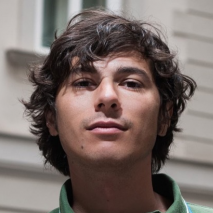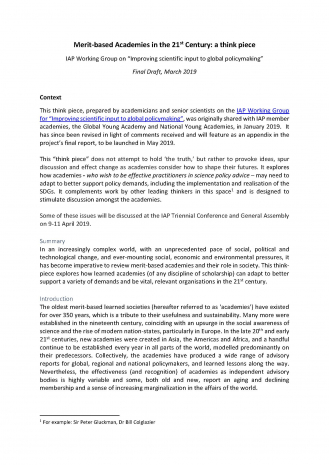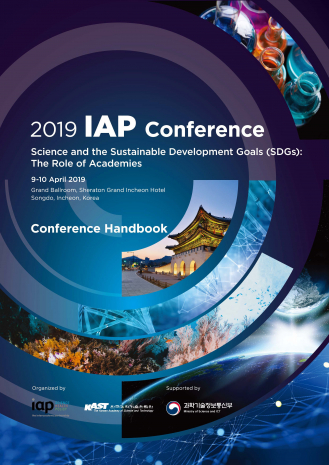2019 IAP Conference and General Assembly
Overview
The IAP Conference and General Assembly was hosted by IAP in collaboration with the Korean Academy of Science and Technology (KAST) in April 2019.
Programme
The Opening Ceremony took place on Tuesday 9 April followed by the two-day conference on Science and the Sustainable Development Goals: The role of academies ending on Wednesday 10 April 2019.
The conference explored how science is required to underpin and advance progress towards achieving the 17 goals of the UN 2030 Sustainable Development Agenda, and in particular, what role academies and – and should – play towards achieving these goals.
Participants included distinguished scholars, presidents and leadership of national academies of science, medicine, engineering, as well as experts and health advisors from both industrialized and low and middle income countries (LMIC).
The third day, Thursday 11 April 2019, was dedicated to the General Assemblies of IAP Science and IAP Health, and the joint InterAcademy Partnership meeting, all of which are closed sessions for representatives of member academies only.
The key decisions taken at the 2019 IAP Assembly are:
- Eight academies (Global Young Academy, European Academy of Sciences and Arts, Zambian Academy of Sciences, Peruvian Academy of Sciences, Peruvian Academy of Medicine, Korean Academy of Science and Technology, Korean Academy of Medicine, and the National Academy of Sciences, Cordoba, Argentina) were accepted as full members of IAP and can make nominations to any IAP study or project.
- IAP-Research was renamed IAP-Policy to better reflect its work
- New applications for IAP membership will be reviewed by members of the steering committee (six co-chairs) rather than the General Assembly to streamline the membership process
- All current member academies are now considered members of the InterAcademy Partnership as a whole rather than of one or more of the constituent networks (IAP-Health - Science or -Policy).
- The GA unanimously approved the Strategic Plan and Implementation Plan. The strategic plan is now available on the IAP website (available here).
- The GA approved a revised IAP structure with one unified Board, one unified Executive Committee, and several thematic groups (initially Science, Health and Policy-themed). The GA delegated to the current co-chairs and secretariat the authority to develop a detailed model for this revised structure based on these principles, which will be subject to endorsement by electronic ballot.
The IAP Strategic Plan for 2019 - 2022 is available here.
CO-CHAIRS
Prof Volker ter Meulen, President, IAP
Prof Myung-Chul Lee, PresIdent , Korean Academy of Science and Technology, KAST
COMMITTEE MEMBERS
- Prof Paulo Artaxo, Brazilian Academy of Sciences
- Prof Richard Catlow, Royal Society, IAP for Research
- Prof Luiz Davidovich, Brazilian Academy of Sciences
- Prof Roseanne Diab, Academy of Science of South Africa
- Prof Rajae El-Aouad Hassan II Academy of Science & Technology Morocco
- Dr Tracey Elliott, IAP project Director, UK
- Dr Peggy Hamburg, National Academy of Medicine, USA
- Prof Mohamed Hassan, Sudan National Academy of Science
- Prof Andrew Holmes, Australian Academy of Science
- Prof Krishan Lal, Co-chair, IAP for Science
- Prof Liu Depei, Chinese Academy of Engineering, President IAP
- Dr Connie Nshemereirwe, Co-chair Global Young Academy
- Prof Soon-Chang Yoon, Korean Academy of Science and Technology, KAST
- Prof Malik Ghallab, LAAS-CNRS, University of Toulouse
- Dr Peter McGrath, Coordinator, IAP
- Dr Teresa Stoepler, Executive Director, IAP for Research
Project
Publications
Project
Updates
People and Institutions

Resources
Other resources
The 2019 triennial conference was themed on the role of science and the academies in supporting the UN Sustainable Development Goals (SDGs). It provided a platform for exploring opportunities to engage, sharing good practice and lessons learned, and identifying priority actions where academies can best add value. Summary note written by Dr Tracey Elliott, IAP Policy Project Director.















































